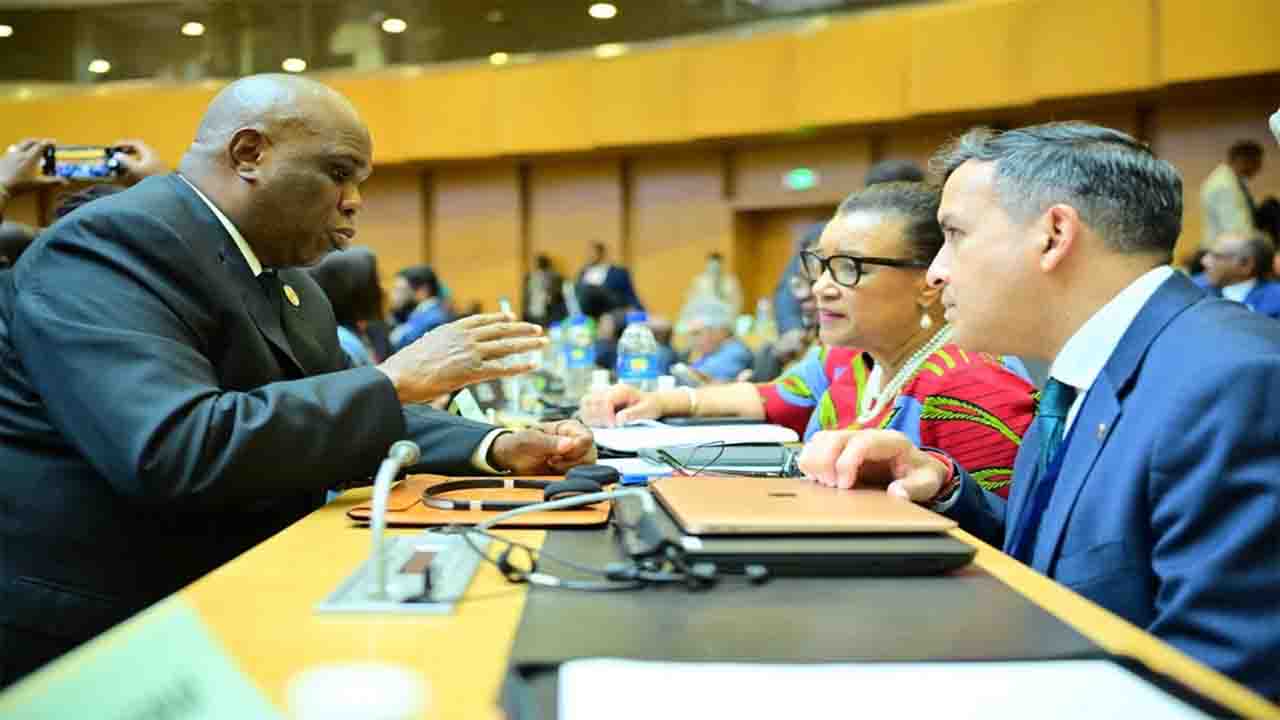UK (Commonwealth Union)_ The Commonwealth Secretariat and the African Union have reiterated their commitment to revamping the global financial framework to enhance Africa’s access to international finance. At the recent Presidential Dialogue held during the 37th Ordinary Session of the Assembly of the African Union in Addis Ababa, leaders emphasized the pressing need to rectify the current quota system, which disproportionately favors developed countries, leaving Africa with limited resources and influence.
Also read: PROMOTING COMMONWEALTH VALUES ACROSS ASIA
Addressing from Ethiopia, Commonwealth Secretary-General, The Rt Hon Patricia Scotland KC, underscored the imbalance in the global financial architecture, particularly its failure to address Africa’s vulnerability in climate adaptation. Scotland emphasized that the current system is inadequate and unfair, urging the swift implementation of new financing mechanisms that prioritize countries with the greatest needs. She highlighted the Commonwealth Universal Vulnerability Index as a tool to allocate development funding more effectively, targeting vulnerable countries for support.
Also read: BACKING UP ESWATINI’S HUMAN RIGHTS ADVANCEMENT
The Secretary-General said, “The global financial architecture lacks balance and fails to consider the vulnerability of many African economies to climate adaptation. As far back as 2018, the Commonwealth said that it’s not fit for purpose. If you look at what is happening in so many of our countries when it comes to climate change, you can see that the financial structure does not consider Africa’s vulnerability. It simply doesn’t work, and it cannot be fair.” She added, “This is why we introduced the Commonwealth Universal Vulnerability Index – to consider multidimensional vulnerability in allocating new development funding. It helps target international finance, including overseas aid and debt relief, for countries in need of support”.
With twenty-one Commonwealth countries as members of the African Union, Scotland advocated for collaboration to leverage knowledge, expertise, and finance towards achieving desired change. She stated, “Twenty-one Commonwealth countries are members of the African Union. They contribute to other multilateral organizations and support development banks that play a crucial role in financing and investing on the continent. If we pool together our knowledge, expertise, abilities, and finances, we will deliver the change we want to see.”
The dialogue aimed to reshape Africa’s development financing paradigm, recognizing the pivotal role of international financial institutions, development banks, and global economic governance structures. Heads of State and Government, Ministers of Finance and Economy, Central Bank Governors, Ministers of Foreign Affairs, international organizations, and development partners convened for the presidential dialogue, wherein they emphasized the urgency of implementing proactive measures to enhance Africa’s financial accessibility.
During the dialogue, the Alliance for African Multilateral Financial Institutions (AAMFI) – Africa Club was launched to address financing challenges and support sustainable economic development on the continent. Comprising African Multilateral Financial Institutions (AMFIs) such as AfreximBank, TDB, AFC, Africa Re, and ATIDI, the Africa Club aims to strengthen Africa’s position in the evolving global financial landscape, holding assets exceeding US$53 billion and attracting significant equity investment.
Secretary-General Scotland discussed potential collaboration with AfreximBank President Benedict Oramah to support small and vulnerable Commonwealth states. Additionally, talks focused on transparency and Africa’s debt crisis, with Scotland highlighting the benefits of the Commonwealth’s Public Debt Management Programme, including the Commonwealth Meridian software, which enhances debt management operations and fosters financial resilience. Additionally, the tool has been effectively implemented in Botswana, St. Vincent and the Grenadines, Antigua and Barbuda, and most recently, in Nigeria, with the objective of revolutionizing the nation’s public debt portfolio management, which currently stands at US$114.34 billion.
In Addis Ababa, Secretary-General Scotland engaged with government ministers and officials to deepen partnerships between the Commonwealth and the African Union, highlighting initiatives such as global trade advocacy, the Commonwealth Sustainable Development Goals Tracker, and climate programs. Supported by Assistant Secretary-General Prof Luis Franceschi, Adviser Abiola Sunmonu, and Political Officer Hafsa Maalim, Scotland’s discussions aimed to advance cooperation towards achieving sustainable development and economic integration objectives across member states.








